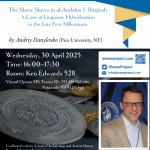
The burial cave of rabbi Judah, Beit She’arim, Israel
In a famous passage from the Talmud, which even got its own code in the Aarne-Thompson motif index (J 1111.6.1), a clever maidservant puts all the greatest rabbinic minds of her time to shame without even noticing it. It turns out that she, and perhaps the other maidservants preserve the tradition of the ethnos’ language better than those entrusted with it.
In the Babylonian Talmud Rosh Hasahnah 26b we hear:
Our teachers [rabbis] did not know what is serugin. They heard the maidservant of the house of Rabbi [Judah the Prince] who saw the sages that were entering the house one by one. She told them: how much longer are you going to enter the house serugin serugin?
Our teachers (rabbis) did not know what is ḥaloglogot. One day they heard the maidservant of the house of Rabbi [Judah the Prince] who saw a man who was scattering his purslane, she told him: when are you going to stop scattering your ḥaloglogot?
Our teachers did now know what is salsela and it will exalt you (Prov. 4:8), [literally meaning ‘curl yourself around it’, regarding Wisdom]. One day they heard the maidservant of the house of Rabbi who was saying to this man who was curling his hair: when are you going to stop mesalsel your hair?
Our teachers did not know what v’titeti b’matate of destruction (Is. 14:23) means. One day they heard the maidservant of the house of Rabbi say to another maidservant, take this tateita [broom] and tatei [sweep] the house.
The sages, in case you have missed it, are struggling with the meaning of words found both in the Mishna, the earlier strand of rabbinic textual production, and in the Bible. They seem to struggle for a while until they accidently overhear the maidservant of Rabbi use them in context, and then are able to understand their meaning. The maidservant seems to be anything but stupid or powerless. In all the cases she reproaches the free for their annoying behaviours. Once for the rabbis entering the house intermediately and not at once (thus causing her a nuisance); once a man whose sowing practices seem to be wasteful; and once for overindulging in hair styling. The last example is perhaps the most interesting, as her addressee is another maidservant, making the point that not only this one maidservant knows the meaning of the biblical word the rabbis do not, but all the maidservants in the house do. While all the words seem to reflect something of a maidservant everyday life in a big house (sweeping, styling hair, sowing seeds), they are nevertheless parts of the sacred tradition and so the slaves win the battle of minds or biblical exegesis against the ‘experts’, the free male rabbis. Why would the rabbis tell this story? Especially Babylonian rabbis who are notorious in Palestinian sources for not being very versed in the Bible themselves? Is this meant to be a joke? A declaration about how the lowest in the house of the great is cleverer than the wisest in their own eyes? Or it indeed a folk motif in its rabbinic ecotype?
Do you know of any other examples in which a slave or maidservant beat their master at their own game? We would love to hear!
Dr Tali Artman-Partock





